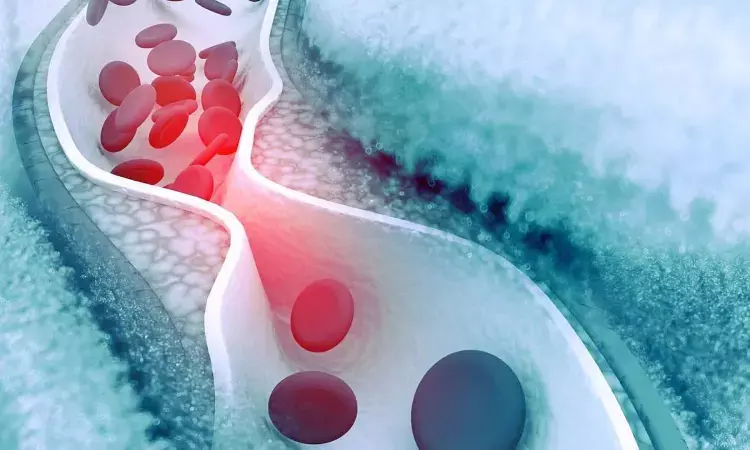- Home
- Medical news & Guidelines
- Anesthesiology
- Cardiology and CTVS
- Critical Care
- Dentistry
- Dermatology
- Diabetes and Endocrinology
- ENT
- Gastroenterology
- Medicine
- Nephrology
- Neurology
- Obstretics-Gynaecology
- Oncology
- Ophthalmology
- Orthopaedics
- Pediatrics-Neonatology
- Psychiatry
- Pulmonology
- Radiology
- Surgery
- Urology
- Laboratory Medicine
- Diet
- Nursing
- Paramedical
- Physiotherapy
- Health news
- Fact Check
- Bone Health Fact Check
- Brain Health Fact Check
- Cancer Related Fact Check
- Child Care Fact Check
- Dental and oral health fact check
- Diabetes and metabolic health fact check
- Diet and Nutrition Fact Check
- Eye and ENT Care Fact Check
- Fitness fact check
- Gut health fact check
- Heart health fact check
- Kidney health fact check
- Medical education fact check
- Men's health fact check
- Respiratory fact check
- Skin and hair care fact check
- Vaccine and Immunization fact check
- Women's health fact check
- AYUSH
- State News
- Andaman and Nicobar Islands
- Andhra Pradesh
- Arunachal Pradesh
- Assam
- Bihar
- Chandigarh
- Chattisgarh
- Dadra and Nagar Haveli
- Daman and Diu
- Delhi
- Goa
- Gujarat
- Haryana
- Himachal Pradesh
- Jammu & Kashmir
- Jharkhand
- Karnataka
- Kerala
- Ladakh
- Lakshadweep
- Madhya Pradesh
- Maharashtra
- Manipur
- Meghalaya
- Mizoram
- Nagaland
- Odisha
- Puducherry
- Punjab
- Rajasthan
- Sikkim
- Tamil Nadu
- Telangana
- Tripura
- Uttar Pradesh
- Uttrakhand
- West Bengal
- Medical Education
- Industry
Sonolysis Reduces CV Events During Carotid Endarterectomy: Insights from the SONOBIRDIE Trial

Researchers have found in a new trial that Sonolysis Reduces CV Events During Carotid Endarterectomy. The SONOBIRDIE trial, a multicenter, randomized, double-blind, sham-controlled study, evaluated the efficacy and safety of sonolysis-continuous transcranial Doppler (TCD) monitoring using a 2-MHz diagnostic probe—during carotid endarterectomy (CEA).
The trial demonstrated that sonolysis significantly reduced the incidence of periprocedural cerebrovascular events, including stroke and transient ischemic attacks (TIA), without increasing the risk of intracranial hemorrhages.
A study was done to evaluate the effectiveness and safety of sonolysis using a low intensity 2 MHz pulsed wave ultrasound beam during carotid endarterectomy. Participants 1004 patients (mean age 68 years; 312 (31%) female) were enrolled in the study between 20 August 2015 and 14 October 2020 until the interim analysis was performed.
The primary endpoint was the composite incidence of ischaemic stroke, transient ischaemic attack, and death within 30 days.
The incidence of new ischaemic lesions on follow-up brain magnetic resonance imaging was the main substudy endpoint, and incidence of intracranial bleeding was the main safety endpoint. Results The results favoured the sonolysis group for the primary endpoint (11 (2.2%) v 38 (7.6%); risk difference −5.5%, 95% confidence interval (CI) −8.3% to −2.8%; P<0.001), as well as in the substudy for magnetic resonance imaging detected new ischaemic lesions (20/236 (8.5%) v 39/224 (17.4%); risk difference −8.9%, −15% to −2.8%; P=0.004).
Sensitivity analysis resulted in a risk ratio for sonolysis of 0.25 (95% CI 0.11 to 0.56) for ischaemic stroke and 0.23 (0.07 to 0.73) for transient ischaemic attack within 30 days. Sonolysis was found to be safe, and 94.4% of patients in the sonolysis group were free from serious adverse events 30 days after the procedure. Sonolysis was safe for patients undergoing carotid endarterectomy and resulted in a significant reduction in the composite incidence of ischaemic stroke, transient ischaemic attack, and death within 30 days.
Reference:
Školoudík D, et al "Sonolysis during carotid endarterectomy: randomised controlled trial" BMJ 2025; DOI: 10.1136/bmj-2024-082750.
Dr. Shravani Dali has completed her BDS from Pravara institute of medical sciences, loni. Following which she extensively worked in the healthcare sector for 2+ years. She has been actively involved in writing blogs in field of health and wellness. Currently she is pursuing her Masters of public health-health administration from Tata institute of social sciences. She can be contacted at editorial@medicaldialogues.in.
Dr Kamal Kant Kohli-MBBS, DTCD- a chest specialist with more than 30 years of practice and a flair for writing clinical articles, Dr Kamal Kant Kohli joined Medical Dialogues as a Chief Editor of Medical News. Besides writing articles, as an editor, he proofreads and verifies all the medical content published on Medical Dialogues including those coming from journals, studies,medical conferences,guidelines etc. Email: drkohli@medicaldialogues.in. Contact no. 011-43720751


